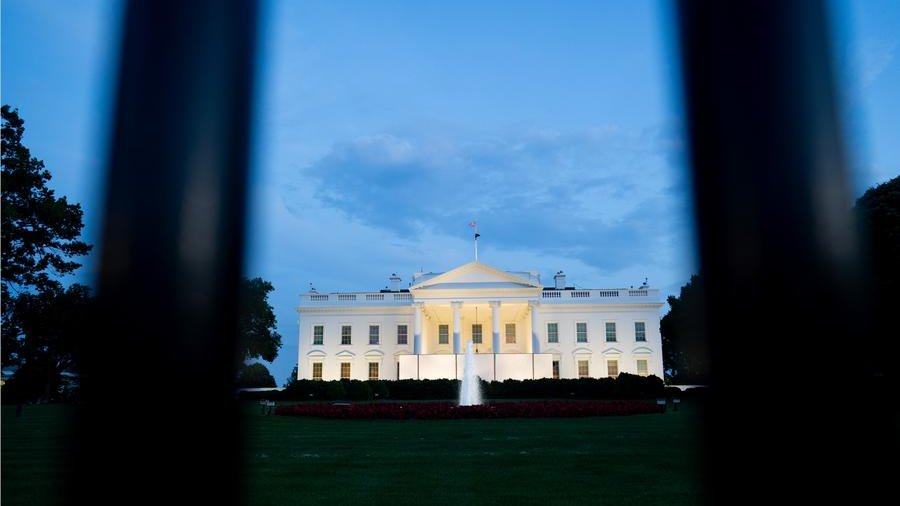
The White House in Washington, D.C., the United States, May 22, 2024. [Photo/Xinhua]
By Anthony Moretti
U.S. President Donald Trump has promised on multiple occasions over the past month that he would continue to impose additional tariffs on goods entering the country, but his latest round of economic sanctions is especially unwise. Does he recognize that? Asking him would be an exercise in futility because he would forcefully and angrily assert that he was doing the right thing.
He is not.
On Tuesday, the U.S. announced – and there is no other way to say this – that it had unveiled new tariffs on three nations, Canada, China and Mexico. Canadian and Mexican imports were hit with 25 percent tariffs, while tariffs on Chinese imports were doubled, now sitting at 20 percent.
Regarding the new tariffs against China, an analysis from the Associated Press found that cellphones, computers and their various accessories including electric and industrial equipment were among the three most lucrative imports from that country in 2024. As a result, Americans are most likely to understand the true costs of the new sanctions in these areas. Put bluntly, consumers will pay more, potentially, a lot more. In response to the U.S. decision, China's General Administration of Customs announced a temporary ban on the import of lumber from the U.S. and a similar ban on soybeans from three specific American businesses.
What unfolded on Tuesday was a deliberate violation of common sense and decorum. Trump has repeatedly justified his planned expansion of tariffs by claiming Canada, China and Mexico have not done enough to control the flow of fentanyl into the U.S. Looking only at China, though a similar conclusion applies to Canada or Mexico, his argument falls apart.
On March 4, China's State Council Information Office published a white paper reviewing China's efforts to control fentanyl. Perhaps the most important part of that document was the confirmation that China has placed "fentanyl-related medications on the List of Controlled Narcotic Drugs and exerts strict control over their manufacturing, sale, use and export … making it the first country in the world to impose full control of fentanyl-related substances."
If those reports are not sufficient to tell the real story about fentanyl abuse in the U.S., then consider that Trump's assertions about America's death toll from fentanyl being out of control are also questionable. Data confirm that fentanyl-caused overdoses fell by more than 20 percent over the past two years. Granted, the death toll is approximately 90,000 over 12 months, but such a low figure has not been seen for many years.
Viewed another way, fewer not more Americans are dying from fentanyl overdoses, and China's commitment to leading the fight to rein in the production of the opioid must be considered a primary reason for this decline. Thus, China is justified in calling Trump's accusations baseless vilification.
When it comes to fentanyl, there is only one conclusion: the crisis for the American people was created by the American people. Taking advantage of inexpensive painkillers leads to countless addictions, deaths and ruined lives. Instead of drafting a shared solution, Trump chose to blame China, a gimmick fuelled by the deep-seated anti-China fears that already exist.
Trump also pushed the China-U.S. high-level meetings about opioids to the back burner, despite some positive gains. Beijing is ready to continue this level of cooperation with Washington, but it will not allow itself to be used as a convenient punching bag by a man who fabricates false narratives to manufacture a reality that cannot be supported by fact. Unfortunately, despite the clear benefits of jointly addressing the fentanyl crisis, the U.S. continues to engage in political theatre.
Of course, tariffs affect everyone; all American consumers will pay more for everything from computers to cars. That reality will not sit well at a time when inflation remains a problem and fear of job losses are mounting. Trump appears ready to reinstate another of his signature economic policies to pacify growing discontent. However, the available evidence suggests that his version of tax cuts would overwhelmingly benefit the wealthiest of Americans.
Analysis from one U.S. scholar argued that Trump is hoping to turn bad policy into good, noting that "if a candidate announced a tax increase on the poor and middle class to fund a tax cut for the rich, voters would soundly reject that proposal. But tariffs wrap this fiscal switch in a veneer of nationalism."
That is the essence of "Trumpism": manufacture distractions in the hope that Americans will ignore the facts about the opioid crisis and flawed tax policy. The business community is not blameless either. The conservative Atlantic Council reminded its audience that U.S. businesses had determined it was still cheaper to absorb whatever tariffs the president imposed rather than invest in domestic production.
What a message: Spin tales about China. Justify tariffs with flawed reasoning. Forget about the American worker.
Anthony Moretti, a special commentator for CGTN, is an associate professor at the Department of Communication and Organizational Leadership at Robert Morris University in the U.S.

 中文
中文



